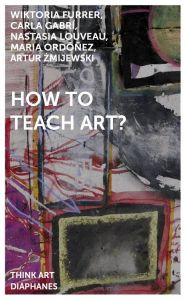
How to teach art? What kind of knowledge should artists absorb? How might an ordinary person become a creature addicted to the creative process; a non-artist become an artist? Such programmatic questions articulated by the acclaimed Polish artist Artur Żmijewski were at the heart of the workshop “How to Teach Art?” Between April and July 2018, Żmijewski invited a group of graduate and PhD students from three Zurich universities—the ETH (Swiss Federal Institute of Technology), the UZH (University of Zurich), and the ZHdK (Zurich University of the Arts)—to collectively reflect on their artistic practices. Over the course of four months, the group met several times a week for hourlong sessions, following individual and collective exercises devised by Żmijewski himself.
This book retraces the workshop and its process by means of inconclusive, fragmentary results between theory and practice. It presents drawings, videos, photographs, 16mm films, and accompanying reflections on the central premise, “How to Teach Art?”
Wiktoria Furrer is a research associate with
Silvia Henke at the Lucerne University of Applied Sciences and Arts (HSLU) as part of the Sinergia research project “Practices of Aesthetic Thinking.” She is a member of the doctoral program “Epistemologies of Aesthetic Practices,” formerly led by
Dieter Mersch.
Carla Gabrí is a member of the research project “Exhibiting Film: Challenges of Format,” led by Fabienne Liptay, and an associate of the doctoral program “Epistemologies of Aesthetic Practices,” formerly led by
Dieter Mersch. Her artistic practice oscillates between the media of film, painting, and object art, with series on prosopagnosia, obsolescence, and skin.
Nastasia Louveau explores dialogic processes and the notion of critical learning in her combined artistic, research and teaching practices. A self-taught artist trained as a cultural researcher and educator, she deals with issues through a hands-on approach grounded in sharing, caring, and curiosity.
Maria Ordóñez has developed her artistic practice focused on collectivity as a discipline of ethical engagement and shared knowledge, mostly in working with people affected by violence in Colombia, where she comes from.
Radical Polish artist Artur Żmijewski (born 1966 in Warsaw) is one of the most consistently challenging, provocative and profoundly thoughtful artists working today. He is an author of short video movies and photography exhibitions, which were shown all over the world. In 2005 he represented Poland at the 51st Venice Biennale. He exhibited at Documenta 12 (2007), Manifesta 4 (2002), Wattis Institute for Contemporary Art, San Francisco (2005), Kunsthalle, Basel (2005), National Gallery of Art Zacheta, Warsaw (2005), Kunstwerke, Berlin (2004), Museum of Modern Art, New York (2009), Cornerhouse, Manchester (2009) and many more. He is the curator of the Berlin Biennale 2012.
